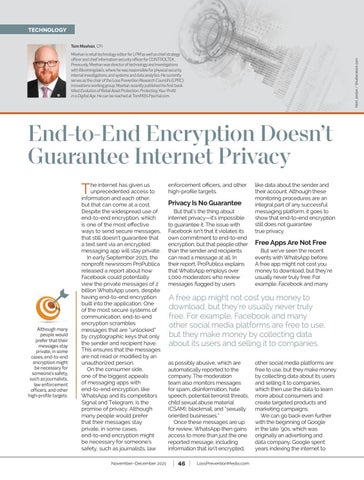TECHNOLOGY Tom Meehan, CFI Mott Jordan / Shutterstock.com
Meehan is retail technology editor for LPM as well as chief strategy officer and chief information security officer for CONTROLTEK. Previously, Meehan was director of technology and investigations with Bloomingdale’s, where he was responsible for physical security, internal investigations, and systems and data analytics. He currently serves as the chair of the Loss Prevention Research Council’s (LPRC) innovations working group. Meehan recently published his first book titled Evolution of Retail Asset Protection: Protecting Your Profit in a Digital Age. He can be reached at TomM@LPportal.com.
End-to-End Encryption Doesn’t Guarantee Internet Privacy T
Although many people would prefer that their messages stay private, in some cases, end‑to‑end encryption might be necessary for someone’s safety, such as journalists, law enforcement officers, and other high-profile targets.
he internet has given us unprecedented access to information and each other, but that can come at a cost. Despite the widespread use of end-to-end encryption, which is one of the most effective ways to send secure messages, that still doesn’t guarantee that a text sent via an encrypted messaging app will stay private. In early September 2021, the nonprofit newsroom ProPublica released a report about how Facebook could potentially view the private messages of 2 billion WhatsApp users, despite having end-to-end encryption built into the application. One of the most secure systems of communication, end‑to‑end encryption scrambles messages that are “unlocked” by cryptographic keys that only the sender and recipient have. This ensures that the messages are not read or modified by an unauthorized person. On the consumer side, one of the biggest appeals of messaging apps with end-to-end encryption, like WhatsApp and its competitors Signal and Telegram, is the promise of privacy. Although many people would prefer that their messages stay private, in some cases, end‑to‑end encryption might be necessary for someone’s safety, such as journalists, law
November–December 2021
enforcement officers, and other high-profile targets.
Privacy Is No Guarantee But that’s the thing about internet privacy—it’s impossible to guarantee it. The issue with Facebook isn’t that it violates its own commitment to end-to-end encryption, but that people other than the sender and recipients can read a message at all. In their report, ProPublica explains that WhatsApp employs over 1,000 moderators who review messages flagged by users
like data about the sender and their account. Although these monitoring procedures are an integral part of any successful messaging platform, it goes to show that end-to-end encryption still does not guarantee true privacy.
Free Apps Are Not Free But we’ve seen the recent events with WhatsApp before. A free app might not cost you money to download, but they’re usually never truly free. For example, Facebook and many
A free app might not cost you money to download, but they’re usually never truly free. For example, Facebook and many other social media platforms are free to use, but they make money by collecting data about its users and selling it to companies. as possibly abusive, which are automatically reported to the company. The moderation team also monitors messages for spam, disinformation, hate speech, potential terrorist threats, child sexual abuse material (CSAM), blackmail, and “sexually oriented businesses.” Once these messages are up for review, WhatsApp then gains access to more than just the one reported message, including information that isn’t encrypted,
| 46 |
LossPreventionMedia.com
other social media platforms are free to use, but they make money by collecting data about its users and selling it to companies, which then use the data to learn more about consumers and create targeted products and marketing campaigns. We can go back even further with the beginning of Google in the late ‘90s, which was originally an advertising and data company. Google spent years indexing the internet to















